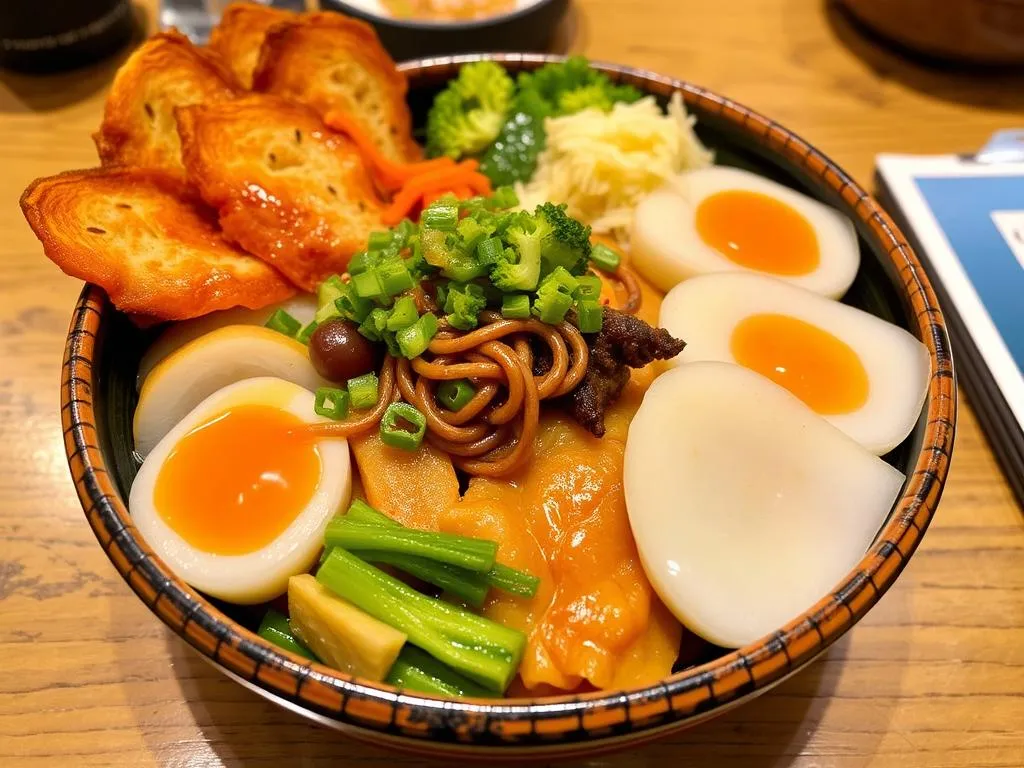Introduction
The Japanese culture has long been revered for its deep appreciation of the spiritual aspects of everyday life, and this reverence extends to the realm of food. The japanese food spiritual meaning is not just about satisfying physical hunger, but about nourishing the body, mind, and soul. As you delve into the world of Japanese cuisine, you’ll discover a rich tapestry of traditions, philosophies, and rituals that elevate the act of eating into a truly transformative experience.
In this article, we’ll explore the profound spiritual significance of japanese food and how it can enhance your overall well-being. Get ready to embark on a journey that will not only tantalize your taste buds but also feed your inner spirit.
Key Takeaways
- The japanese food spiritual meaning is rooted in the principles of harmony, balance, and respect for nature.
- Mindful eating, or “itadakimasu,” is a cornerstone of the Japanese culinary tradition, encouraging a deep appreciation for the ingredients and the act of nourishing oneself.
- The presentation and aesthetics of Japanese dishes are not merely decorative but rather a reflection of the cultural reverence for beauty and attention to detail.
- The concept of “umami,” the fifth taste, is central to the japanese food spiritual meaning, as it represents the perfect balance of flavors.
The Harmony of Japanese Cuisine
At the heart of the japanese food spiritual meaning lies the principle of harmony, or “wa.” This concept emphasizes the importance of balance, both in the flavors and the overall dining experience. Japanese chefs strive to create dishes that are not only delicious but also visually appealing, reflecting the natural beauty of the ingredients.
The presentation of Japanese food is a testament to this reverence for harmony. Dishes are often arranged with meticulous care, using seasonal ingredients and colors that evoke the natural world. This attention to detail is not merely aesthetic; it is a way of honoring the ingredients and the connection between the food and the earth.
Mindful Eating: The Art of “Itadakimasu”
One of the most significant aspects of the japanese food spiritual meaning is the practice of “itadakimasu,” or mindful eating. Before a meal, the Japanese people often say this phrase, which translates to “I humbly receive.” This simple act is a way of expressing gratitude for the food, the people who prepared it, and the natural resources that went into its creation.
Mindful eating encourages a deep appreciation for the nourishment we receive, both physically and spiritually. It invites us to slow down, savor each bite, and connect with the present moment. This practice helps to cultivate a sense of reverence and respect for the food we consume, fostering a deeper connection with the natural world and the cycle of life.
The Umami Factor
Another crucial element of the japanese food spiritual meaning is the concept of “umami,” the fifth taste. Umami is often described as a savory, meaty flavor that enhances the overall experience of a dish. It is not just about satisfying the palate but about creating a harmonious balance of flavors that nourishes the body and the soul.
The pursuit of umami is a hallmark of Japanese cuisine, as chefs strive to create dishes that are perfectly balanced and deeply satisfying. This quest for the perfect umami is not just a culinary pursuit but a spiritual one, as it reflects the Japanese reverence for the natural world and the belief that true fulfillment comes from finding the right balance in all aspects of life.
The Healing Power of Japanese Food
The japanese food spiritual meaning extends beyond the realm of taste and aesthetics; it also encompasses the belief that food can have a profound impact on our physical and emotional well-being. Many Japanese dishes are designed to promote health and longevity, using ingredients that are believed to have healing properties.
For example, miso soup, a staple in the Japanese diet, is often touted for its ability to boost the immune system and improve digestion. The fermentation process used to create miso is thought to enhance the bioavailability of nutrients, making it a nourishing and restorative food.
Similarly, the use of seasonal, locally-sourced ingredients in Japanese cuisine is not just a culinary preference but a way of aligning with the natural rhythms of the earth. By eating foods that are in harmony with the changing seasons, the Japanese believe that we can better attune ourselves to the cycles of nature and the ebb and flow of our own well-being.
Conclusion
The japanese food spiritual meaning is a rich and multifaceted concept that invites us to approach the act of eating with a deep sense of reverence, gratitude, and connection. By embracing the principles of harmony, mindfulness, and the pursuit of umami, we can not only nourish our bodies but also feed our souls.
As you delve deeper into the world of Japanese cuisine, may you find a renewed appreciation for the sacredness of food and the power it holds to transform our lives. Remember, the japanese food spiritual meaning is not just about what we consume, but how we consume it – with a heart and mind that are open to the profound gifts that nourishment can bring.








